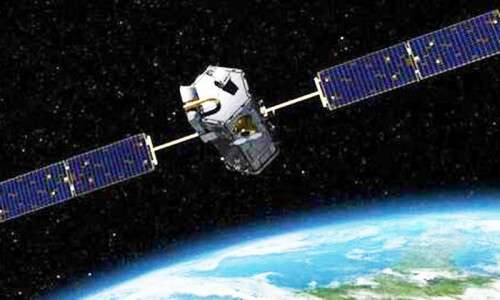In a bid to become Japan’s first private company to successfully launch a satellite into orbit, Space One, a Tokyo-based space exploration firm, has postponed its second attempt at launching the Kairos rocket. The decision came after weather conditions, specifically strong winds, made it unsafe to proceed. The company had originally planned the launch for 11 a.m. on Saturday but announced the postponement just 20 minutes before the scheduled liftoff.
This delay follows a failed attempt earlier this year when the Kairos rocket exploded mid-air during its inaugural launch. Space One has now set its sights on rescheduling the launch for the following day, Sunday at 11 a.m. The company remains determined to push forward with its ambitious space exploration goals, hoping to emulate the success of other private space companies, such as Elon Musk’s SpaceX.
H2: Space One’s Ambitious Space Goals and Setbacks
Space One aims to revolutionize Japan’s space industry by becoming the first private company in the country to place a satellite into orbit. The company’s Kairos rocket, a solid-fuel vehicle, is designed to carry small payloads into space, including government and commercial satellites.
Despite the initial setback in March, when the company’s first launch attempt ended in an explosion mid-air, Space One has remained focused on its goal of achieving space exploration milestones. Space One is not only working toward private satellite launches but also aspires to compete with larger entities such as SpaceX, which has secured contracts with NASA and the U.S. Pentagon. However, Space One’s ambitions have faced some technical and environmental hurdles along the way.
H3: Why the Launch Was Postponed: Weather Concerns
The main reason for the postponement was adverse weather conditions. Space One’s executive, Kozo Abe, explained that the company had closely analyzed the weather data leading up to the launch. It was determined that the wind speeds at an altitude of 10 kilometers (6.2 miles) were too strong for a safe lift-off.
“During the final decision-making process for the launch, we analyzed the weather conditions and determined that the wind speeds above an altitude of 10 kilometers were so strong that it was not suitable for launch,” said Abe. The decision to delay the launch was made after careful deliberation to ensure the safety of the mission, the rocket, and the team.
Abe reassured the public and media that the company would prepare for another attempt on Sunday at the same time, 11 a.m. “We will do our utmost to prepare for tomorrow’s launch,” he added. This highlights Space One’s commitment to its mission despite the setbacks faced.
H3: The Kairos Rocket: Space One’s Flagship Vehicle
The Kairos rocket, which is powered by solid fuel, is central to Space One’s goal of entering the commercial satellite launch market. The rocket’s first attempt in March was supposed to mark a historic moment for Japan’s private space sector but ended in disaster with an explosion at an altitude of about 40 kilometers (24.8 miles). This failure was a blow to the company but did not deter them from their long-term goals.
The rocket is designed to carry a small test satellite for the Japanese government, which would provide critical data for future space missions. Despite the failed first attempt, Space One is committed to perfecting the technology needed to achieve a successful orbital launch.
H2: The Growing Influence of Private Space Companies
Space One is part of a growing trend of private companies pushing the boundaries of space exploration. Unlike government-run space agencies, private firms can offer more affordable and frequent opportunities for launching satellites into space. The private sector’s involvement has also spurred innovation and competition within the space industry, with companies like SpaceX leading the way in revolutionizing space travel.
In Japan, Space One aims to position itself as a key player in the commercial satellite launch industry, competing with established players such as the U.S.-based SpaceX and Europe’s Ariane Group. By offering cost-effective launch solutions, Space One hopes to carve out a significant share of the space market, especially for smaller, more affordable satellite launches.
H3: Challenges for Japan’s Space Industry
Japan’s space industry, traditionally dominated by governmental organizations like the Japan Aerospace Exploration Agency (JAXA), has faced challenges as the private sector begins to grow. While JAXA remains a key player in Japan’s space missions, the entry of companies like Space One signals a shift toward privatization in space exploration.
Despite having advanced technology and expertise in space science, Japan has faced challenges in its pursuit of privatized space launches. The failure of Space One’s first launch serves as a reminder of the technical difficulties that accompany space missions, especially for companies new to the field. With more competition entering the market, Japan’s space industry will need to overcome these hurdles to establish itself as a global leader in space exploration.
H2: Space One’s Resilience and Future Plans
Space One has remained resilient despite the setbacks. The company is focused on learning from past mistakes and continuously improving its technology. As part of its future plans, Space One aims to complete a successful launch and eventually establish regular satellite launch services for commercial and government customers.
Kozo Abe also highlighted the company’s desire to establish a partnership with other countries and space agencies for future launches. As Space One continues to work toward success, the company remains focused on expanding its offerings and increasing Japan’s role in the global space industry.
H3: The Importance of Private Space Companies in the 21st Century
The involvement of private companies in space exploration represents a major shift in the industry. Historically, space exploration was led by government-run agencies like NASA, JAXA, and the European Space Agency (ESA). However, private companies are increasingly playing a central role in space missions, offering more affordable options for launching satellites, and even laying the groundwork for manned space missions to the Moon and Mars.
Space One, like many other private companies, aims to provide cost-effective solutions for satellite launches, which have historically been expensive and limited to government entities. By expanding the market for smaller satellite launches, private companies have made space exploration more accessible and feasible for businesses, startups, and governments alike.
H2: The Road Ahead for Space One
Looking forward, Space One has significant challenges ahead. The delay in launching their second rocket was a setback, but it is also an opportunity for the company to learn and improve. The success of this launch will be pivotal not only for the company but also for Japan’s broader ambitions in space exploration.
For now, Space One’s team is focused on making sure the rocket launch is successful on the second attempt. With perseverance, the company hopes to establish itself as a key player in Japan’s space industry, providing the nation with an innovative and reliable space launch provider.
FAQs
Q1: Why did Space One postpone the second launch attempt of the Kairos rocket? Space One postponed the launch due to strong wind conditions at an altitude of 10 kilometers, which were deemed unsuitable for a safe launch.
Q2: What is the Kairos rocket designed to do? The Kairos rocket is designed to carry small payloads, including government and commercial satellites, into space.
Q3: What happened during Space One’s first launch attempt? Space One’s first launch attempt ended in an explosion at an altitude of about 40 kilometers, which was a setback for the company.
Q4: How does Space One aim to compete with companies like SpaceX? Space One aims to offer more affordable and frequent space launches, positioning itself as a cost-effective solution for smaller satellite launches.
Q5: What are Space One’s future goals? Space One plans to achieve a successful orbital launch and establish regular launch services for both commercial and government customers.
ALSO READ
https://flarenews.pk/2024/12/15/head-blazes-century-australia-reach-234-3-in-third-test/



